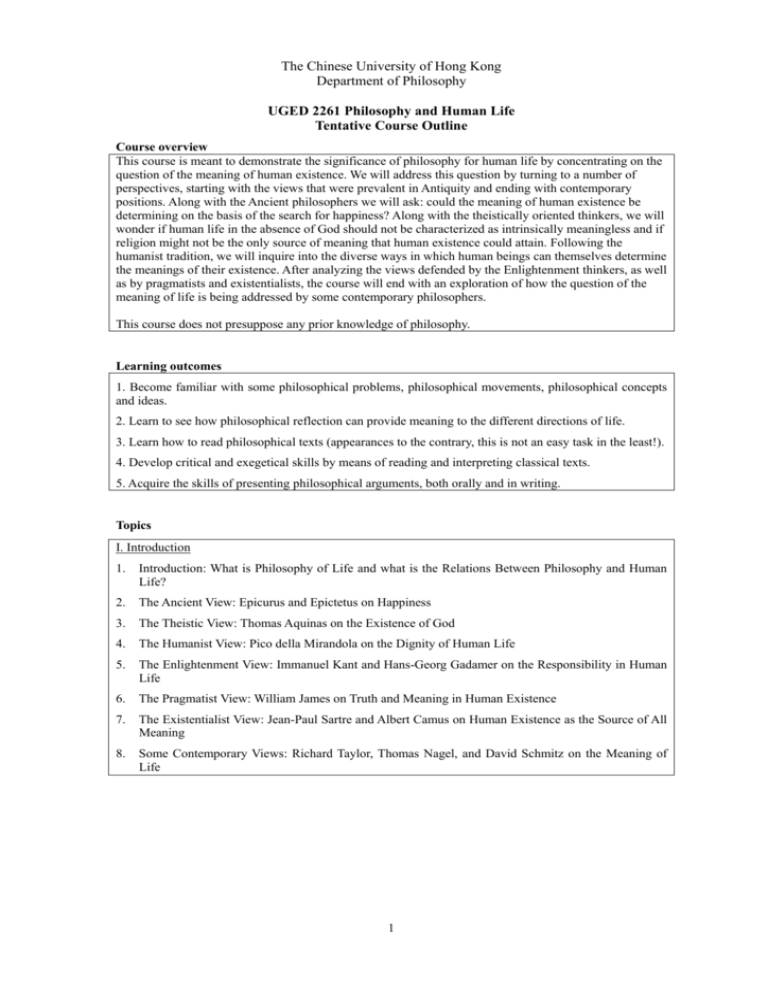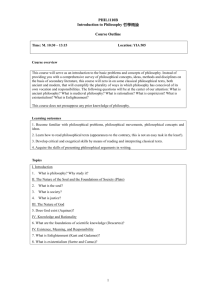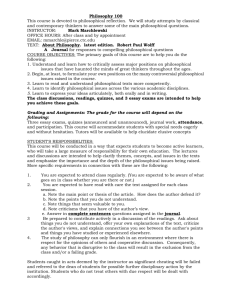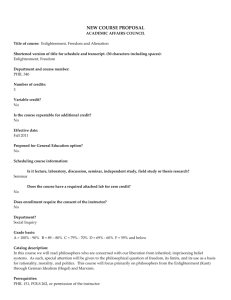The Chinese University of Hong Kong Department of Philosophy
advertisement

The Chinese University of Hong Kong Department of Philosophy UGED 2261 Philosophy and Human Life Tentative Course Outline Course overview This course is meant to demonstrate the significance of philosophy for human life by concentrating on the question of the meaning of human existence. We will address this question by turning to a number of perspectives, starting with the views that were prevalent in Antiquity and ending with contemporary positions. Along with the Ancient philosophers we will ask: could the meaning of human existence be determining on the basis of the search for happiness? Along with the theistically oriented thinkers, we will wonder if human life in the absence of God should not be characterized as intrinsically meaningless and if religion might not be the only source of meaning that human existence could attain. Following the humanist tradition, we will inquire into the diverse ways in which human beings can themselves determine the meanings of their existence. After analyzing the views defended by the Enlightenment thinkers, as well as by pragmatists and existentialists, the course will end with an exploration of how the question of the meaning of life is being addressed by some contemporary philosophers. This course does not presuppose any prior knowledge of philosophy. Learning outcomes 1. Become familiar with some philosophical problems, philosophical movements, philosophical concepts and ideas. 2. Learn to see how philosophical reflection can provide meaning to the different directions of life. 3. Learn how to read philosophical texts (appearances to the contrary, this is not an easy task in the least!). 4. Develop critical and exegetical skills by means of reading and interpreting classical texts. 5. Acquire the skills of presenting philosophical arguments, both orally and in writing. Topics I. Introduction 1. Introduction: What is Philosophy of Life and what is the Relations Between Philosophy and Human Life? 2. The Ancient View: Epicurus and Epictetus on Happiness 3. The Theistic View: Thomas Aquinas on the Existence of God 4. The Humanist View: Pico della Mirandola on the Dignity of Human Life 5. The Enlightenment View: Immanuel Kant and Hans-Georg Gadamer on the Responsibility in Human Life 6. The Pragmatist View: William James on Truth and Meaning in Human Existence 7. The Existentialist View: Jean-Paul Sartre and Albert Camus on Human Existence as the Source of All Meaning 8. Some Contemporary Views: Richard Taylor, Thomas Nagel, and David Schmitz on the Meaning of Life 1 Learning activities In this course, you are expected to • read and think about the assigned readings; • develop the skills mentioned in the course outcomes through philosophical discussion and writing (short essays, examination essays, and summaries of tutorial readings); • attend all lectures/tutorials to participate in discussion. Activities and workload: In-class (mandatory): 1. Lecture: 2 hours each week. 2. Interactive tutorial: one 2-hour session every two weeks. Out-of-class (average workload per week): 1. Reading: 4–5 hours on the basic and suggested readings, 2–3 hours on tutorial reading assignments. 2. Essays: an average of 2–3 hours each week on preparing and writing essay assignments throughout the term. You should try to design a schedule that allows you to apportion more time on writing and discussing your essay with your tutor/teacher two to three weeks before each essay is due. Assessment scheme Since a major aim of this course is to develop students’ ability to interpret, analyze, and generate philosophical arguments through discussion and writing, the assessment methods are designed to encourage participation in tutorial and learning through argumentative writing. Task nature Description Weight Tutorial participation Discussion and Presentation 20% Two reflective summaries 1 page length summaries of the readings 20% Reading Quiz A set of 20 questions 20% Final Essay Around 1500 words 40% Remarks: 1. Tutorial participation (1 briefing + 5 normal sessions): Grading is based on presentation and participation in discussion. Absence will damage your grades: your final score is calculated by multiplying your original score by (1 - 0.2x), where x is the number of times of absence. Detailed guidelines on requirements and assessment method of tutorials will be provided in the briefing session. 2. Reflective summaries: your task is to summarize the weekly readings you are supposed to do before the meeting. Your summaries should be approximately 300-500 words long. 3. Reading quiz: you will need to answer a set of 20 multiples choice questions in class. All the questions will be based on your readings and in-class discussion. 4. Final essay: you may choose to write on any philosophical problem addressed in this course. You will be asked to submit a preliminary statement on a chosen topic three weeks before the essay is due. You will be expected to do some independent research, to formulate a central thesis as well as to develop arguments in support of it. 2 Recommended learning resources 1. Camus, A. The Myth of Sisyphus and Other Essays. Trans. by Justin O’Brien. Vintage, 1991. 2. Epicurus. Letter to Menoeceus. Trans. by Robert D. Hicks. eBooks&Adelaide, 2007. 3. Epicurus. Principal Doctrines. Trans. by Robert D. Hicks. eBooks&Adelaide, 2007. 4. Epictetus. Discourses and Selected Writings. Beacon Press, 1997. 5. Frankl, V. Man’s Search for Meaning. Trans. by I. Lasch. Beacon Press, 1992. 6. Gadamer, H.G. Praise of Theory: Speeches and Essays. Yale University Press, 1999. 7. James, W. Pragmatism and Other Essays. Ed. by Giles Gunn. New York: Penguin Books, 2000. 8. Jaspers, K. Way to Wisdom: An Introduction to Philosophy. Trans. by Ralph Manheim. Yale University Press, 2003. 9. Kant, I. An Answer to the Question, What is Enlightenment? Trans. by H.B. Nisbet. New York: Penguin Books, 2010. 10. Kant, I. Political Writings. Ed. by H.S. Reiss. Trans. by H.B. Nisbet. Cambridge University Press, 1991. 11. Marino, G., ed. Basic Writings of Existentialism. Modern Library Paperback Edition, 2004. 12. Mirandola, P. Oration on the Dignity of Man. Trans. by Robert Caponigri. Chicago: A Gateway Edition, 1956. 13. Nagel, T. “The Absurd,” in Life, Death, and Meaning: Key Philosophical Readings on the Big Questions, ed. by D. Benatar, 2004. 14. Pascal, B. Pensees. Trans. by W. F. Trotter. Grand Rapids, MI: Christian Classics Ethereal Library, 2002. 15. Sartre, J.P. Existentialism is a Humanism. Yale University Press, 2007. 16. Sartre, J.P. Basic Writings. Ed. by Stephen Priest. Routledge, 2001. 17. Schmitz, D. “The Meanings of Life,” in Life, Death, and Meaning: Key Philosophical Readings on the Big Questions, ed. by D. Benatar, 2004. 18. Taylor, R. “The Meaning of Life,” in Life, Death, and Meaning: Key Philosophical Readings on the Big Questions, ed. by D. Benatar, 2004. Feedback for evaluation 1. Students are strongly encouraged to provide feedback on the course via email or meetings with professor or tutors. 2. Midway through the term, students will also be asked to provide feedback via a brief questionnaire on the course. 3. As with all courses in Philosophy Department, students evaluate the course through a survey and written comments at the end of the term as well as via regular feedback between teacher, tutors, and students. This information is highly valued and is used to revise teaching methods, tasks, and content. 3 Course schedule Week Topics Required reading Tutorials 1 What is Philosophy of Life? Viktor Frankl 2 The Early Greek View (1) 3 The Early Greek View (2) Epicurus, “Letter to Menoeceus” and “Principal Doctrines” Epictetus, The Discourses (Selections) 4 The Theistic View (1) Aquinas, TBA 5 The Theistic View (2) Pico della Mirandola, “Oration on the Dignity of Man” (Selections) 6 The Humanist View Immanuel Kant, “An Answer to the Question, What is Enlightenment?” 7 The Enlightenment View (1) 8 The Enlightenment View (2) Hans-Georg Gadamer, “Science as the Instrument of the Enlightenment” William James, “What is Pragmatism?” 9 The Pragmatist View 10 The Existentialist View (1) 11 The Existentialist View (2) 12 Some Contemporary Views (1) 13 Some Contemporary Views (2) 14 Some Contemporary Views (3) Jean-Paul Sartre, “Existentialism is a Humanism” and Nausea Remarks Tutorial 1: Briefing Session Tutorial 2 Reading Quiz Tutorial 3 Tutorial 4 Albert Camus, The Myth of Sisyphus (Selections) Richard Taylor, “The Meaning of Life” Tutorial 5 Submit topic statement for final paper Thomas Nagel, “The Absurd” David Schmitz, “The Meanings of Life” TBA Term paper due * This course schedule is tentative and it might be modified with the aim of adapting it to your intellectual interests and needs. Details of course website Relevant announcements and course documents will be posted on Blackboard. 4 Contact details for teacher(s) or TA(s) Professor Name: GENIUSAS Saulius Office location: 432 FKH Telephone: Email: geniusas@cuhk.edu.hk Academic honesty and plagiarism Attention is drawn to University policy and regulations on honesty in academic work, and to the disciplinary guidelines and procedures applicable to breaches of such policy and regulations. Details may be found at http://www.cuhk.edu.hk/policy/academichonesty/ With each assignment, students will be required to submit a signed declaration that they are aware of these policies, regulations, guidelines and procedures. For group projects, all students of the same group should be asked to sign the declaration. For assignments in the form of a computer-generated document that is principally text-based and submitted via VeriGuide, the statement, in the form of a receipt, will be issued by the system upon students’ uploading of the soft copy of the assignment. Assignments without the receipt will not be graded by teachers. Only the final version of the assignment should be submitted via VeriGuide. 5








